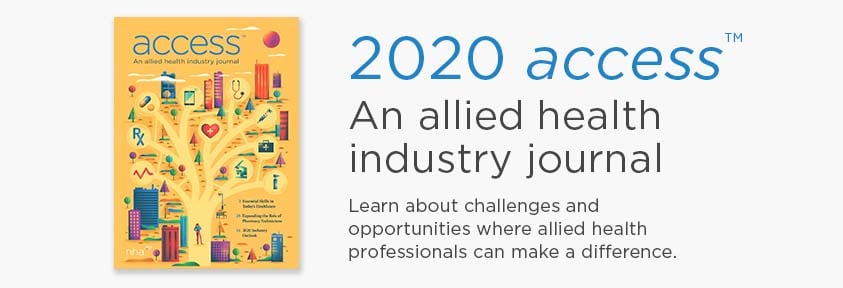While the medical and science community continues to deepen its understanding of the novel coronavirus, the most effective prevention strategies are in the hands of patients. Washing hands, social distancing, wearing a mask in public, disinfecting frequently-touched surfaces, and reviewing personal risk are all behaviors that can help reduce patients' risk of COVID-19.
Some patients see these precautions as an overreaction, and may even be skeptical of getting a vaccine once it is available. Their minds are set. However, clinicians see the impact these precautions have in preventing illness, hospitalization, and mortality.
How can healthcare professionals like Medical Assistants, who have frequent interactions with patients, help influence patients' behaviors so they can better protect themselves and others? The answer may be health coaching.
By employing the foundational skills of health coaching, such as motivational interviewing, healthcare professionals like medical assistants can influence patients’ opinions about and decisions to take recommended precautions and get a vaccine once available.
Busting COVID-19 myths through motivational interviewing
There have been a lot of myths and misinformation circulating when it comes to COVID-19. Here are some of the most common ones you may hear from patients:
- It's no worse than the regular flu.
- Masks don't help / masks increase your risk.
- It only affects old people, so I'm fine.
- I'm healthy, so I don't need to practice social distancing.
Simply throwing statistics and studies at a patient who has these perceptions can be ineffective. They may get defensive or easily dismiss the information. The key is to get to the why—the real reason they have these opinions. That's where health coaching skills, like motivational interviewing, can be effective.

One motivational interviewing technique is called OARS. This technique involves:
- Open-ended questions: when asking patients questions, try framing them in a way that cannot be answered with a simple “yes” or “no”. The goal is to have these questions open up conversation.
- Affirmations: acknowledge a patient’s strengths and behaviors that lead in a direction of positive change.
- Reflections: After listening closely to your patient, verbally reflect what you heard by repeating or paraphrasing, and try to reflect on the emotions communicated from the patient with empathy.
- Summaries: By providing a summary of the conversation, you can check that you understand the patient’s goals and preferences and confirm that the patient understands his or her care plan.
How an effective patient conversation might look
The following conversation is an example of an exchange between a medical assistant and a 67-year-old patient (high risk for COVID-19) after the patient says they aren't wearing a mask in public. Read how the medical assistant incorporates the OARS motivational interviewing technique into the conversation.
Patient: No, I haven't been wearing a mask. I'm not really worried about it.
MA: Can you explain why you're not worried about it? (Open-Ended Question)
Patient: I am healthy, and I don't hang out with anyone who is sick. If I had any symptoms I would stay away from people.
MA: What COVID-19 symptoms have you been on the lookout for? (Open-Ended Question)
Patient: Fever, cough, shortness of breath, loss of taste, diarrhea... all the stuff the news has been sharing.
MA: That's great that you're aware of the symptoms and you're watching for them. (Affirmation)
Patient: Yeah, I try to stay alert. My health is important to me.
MA: Do you mind if I share some additional information with you?
Patient: No, of course not. Please do.
MA: Many people think that they can only get the virus if someone is showing symptoms. However, we know asymptomatic carriers are infecting people, and they can do it just by talking to you. Respiratory droplets are produced when talking, and can infect you if they land in your mouth, nose, or are inhaled into your lungs. So wearing a mask can help prevent this spread when people are unaware they are infected.
Patient: I didn't realize it could spread just through talking. I thought it was proven that people without symptoms weren't spreading the disease?
MA: There's been a lot of conflicting information going around, and I know it can be confusing. The truth is that we're still learning a lot about it. We're not totally sure how common asymptomatic spread is, but we do know that it happens, and it's important for everyone to be very cautious, especially those who are high risk.
Patient: Well that's me because of my age. I will try to keep out of public as much as possible and wear a mask when I do go out just to be safe until there's a vaccine.
MA: Good for you for protecting your health, and the health of others around you! (Affirmation)
MA: So just to confirm, in addition to the other precautions, like washing your hands and social distancing, you're going to start wearing a mask in public. (Reflection)
Patient: That is correct.
MA: And to summarize, you'll continue these strategies until there's a vaccine available? (Summary)
Patient: Yes that's right. The day can't come soon enough!
Building medical assistants' health coaching skills can truly make a difference when it comes to effective conversations that lead to actual behavior change. This is especially important now, when we're facing a global pandemic and the best way to contain it is in the hands of our patients. Their actions, or inactions, can truly save lives.
How can you build your healthcare team's health coaching skills?
NHA’s Principles of Health Coaching™ provides a simple, innovative way for educators and employers of clinical care professionals to help their clinicians build the necessary skills for better patient communication, education and engagement. It can be completed completely online.





